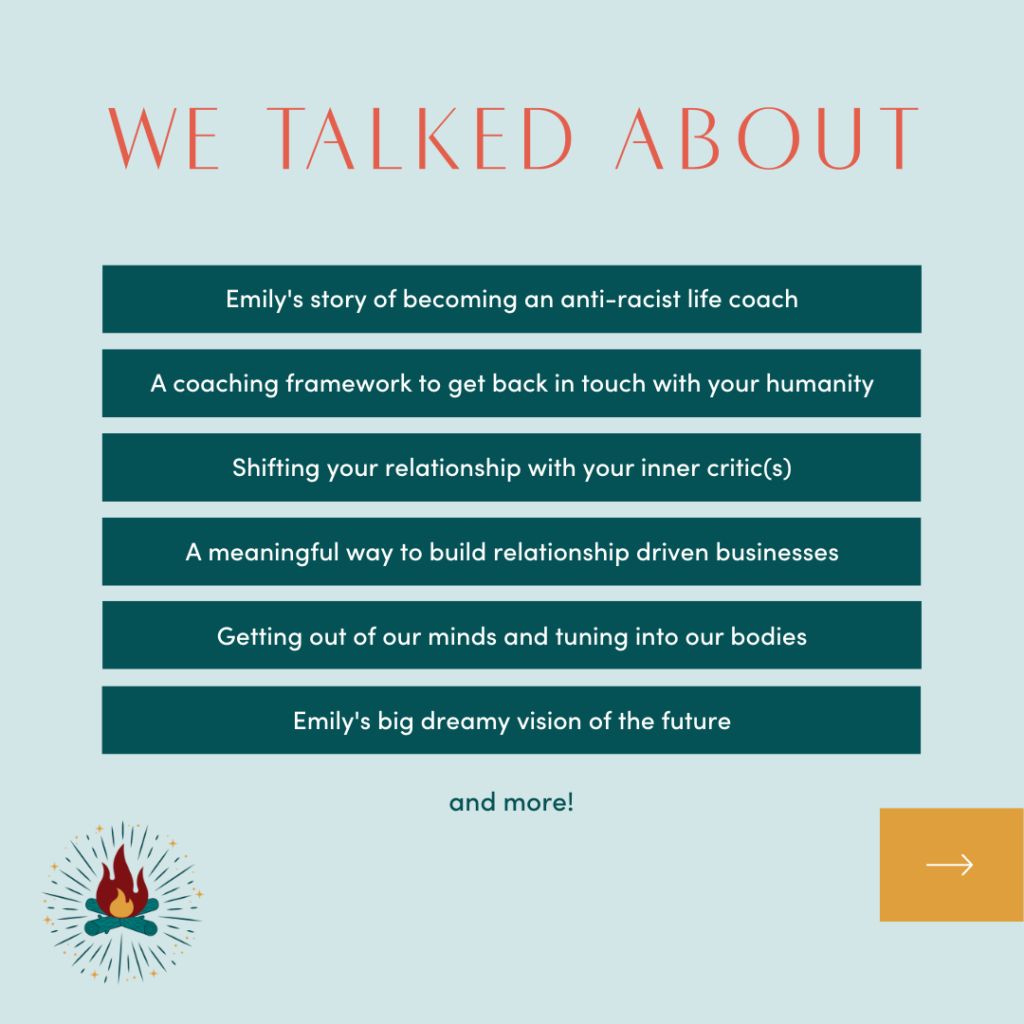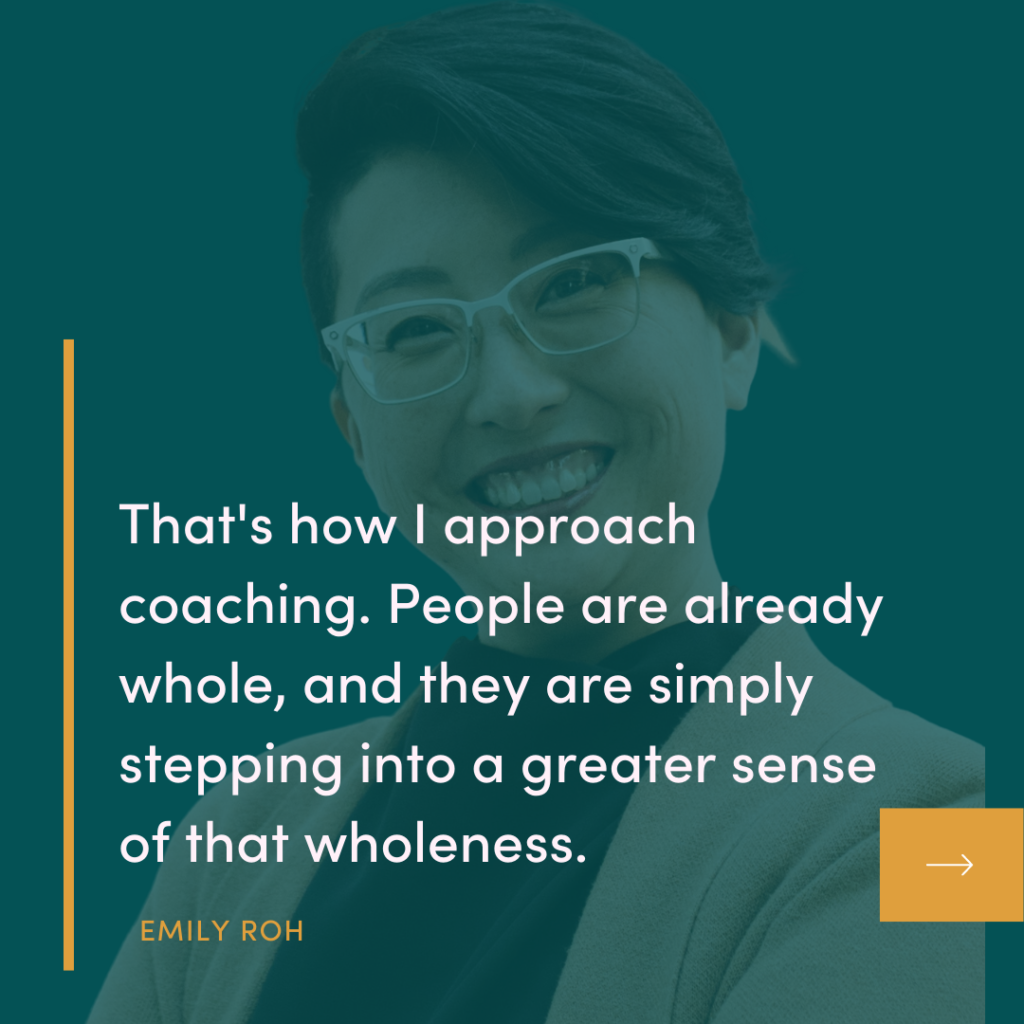Emily Roh is an anti-racist life coach and facilitator for people of color and organizations who want to make the world a more just and equitable place. Emily works with her clients to unpack internalized white supremacy and transform their relationships with themselves through courageous self-compassion. And I can personally attest to her magic!
This episode may change the way you look at yourself and the way you show up in your social impact work. Emily and I talk about getting out of our heads and tapping into the wisdom of our bodies, marketing our businesses by being rooted in our values, acknowledging our influences, building collaborative, relationship-driven businesses, and much more.
“My work is really about healing and liberation. So, whatever white supremacy is doing … whatever capitalism and colonization are doing, I’m interested in looking at what’s the opposite of that. Right? So white supremacy culture is about perfectionism. So my antidote is, “How do we play in this space?” – Emily Roh
Highlights from the podcast episode:

We discussed:
[02:19] Emily’s story of becoming an anti-racist life coach
Forty some odd years ago, I was born to evangelical Korean immigrants living in the LA area. When I hit school, I was thrust into this world that no one prepared me for. I was just expected to figure it out on my own. I know I’m not the only one who struggles or experiences this, but it very much shaped my perception of myself and my place in the world.
Growing up, I always felt like an outsider. In school, there were a lot of other Asian kids, but it was predominately a Vietnamese community. My brother and I were the only Korean kids in the school. By the time I got to high school, all of this had really messed with me. I tried to be as white as possible because I’m a teenager, I’m trying to fit in, I want a friend and I’m extremely socially awkward. I really had terrible self-esteem. What teenage girl doesn’t? Let’s be honest. But I thought trying to fit in would be my way towards belonging, and that just really wasn’t the case.
I think once I embraced my own uniqueness and weirdness, that’s when I really started to blossom. That happened in conjunction with going to college when I studied Asian American Studies. I could see myself reflected in the classroom. It gave me a lot of language and framework for understanding the world and completely shifted my worldview.
But, it was super intellectual. I went to UCLA so it was all about being in our heads, all about rational arguments, all about research. I had this very linear framework about what was right or wrong. It was very black and white.
What I [eventually] learned is the importance of just being compassionate, and seeing people as individuals and not just their identities.
[09:47] A coaching framework to get back in touch with your humanity
I was taught the Christian framework of original sin – You are sinful, and you need Jesus to save you. Meeting my parents’ expectations and the high-pressure academic environment was really connected to my sense of worth. It was a lot that I had to unpack.
I [eventually] learned about this Buddhist perception or Buddhist framework that we are inherently good. We are inherently like gold. What life does to us is build layers and layers of grime on top of that. The work is really about scraping away the grime and returning to our inner goodness. That’s really how I approach coaching. It’s the framework that people are already whole, and they are just simply stepping into a greater sense of that wholeness. That has been an important principle for me to follow. Racism wants us to believe that we’re not right. Racism wants us to stay small. When we challenge that belief, that’s a really big unpacking of all the stuff we’ve internalized.
Oppression is traumatic. I think of trauma as a big spectrum. We have trauma like the “big T,” where you’re getting PTSD diagnoses and you’ve gone through some really horrible things in your life. Trauma with a lowercase “t” is the daily microaggressions and beliefs that we’re confronted with on a daily basis: like if you don’t get straight A’s, then you’re not a good person or a good daughter.
Those things build up and build up and cause trauma in our bodies. The reason this happens in my worldview is that colonization, capitalism, and white supremacy want to dehumanize us, to disconnect from ourselves and each other in order to exploit us. It wants to disconnect us from the earth so that it can exploit the resources of the Earth. We take all this, and we’re gaslit, we’re unworthy, we’re disconnected from ourselves.
When clients come to me, they’re coming to me from a place of feeling angry or stuck or afraid. There’s no space that we’ve created in our society to really hold each other. Exploring that is the work that I get to do as a coach.
The trauma we experience on a daily basis is stored in our bodies. There’s a lot of neuroscience and neurobiology research demonstrating this now, measuring and capturing things that Indigenous cultures around the world already knew for many, many years. My work is really about healing and liberation.
Whatever white supremacy is doing, whatever capitalism and colonization are doing, I’m interested in looking at the opposite of that. White supremacy culture is perfectionism. My antidote is, “How do we then play in this space? How do we explore? How do we reconnect with our bodies and our feelings? When we feel our feelings, can we notice what happens to our bodies? Where do we feel those senses of construction? Where do we feel that weight? Where do we feel that tension and tightness?”
By mindfully and gently being with whatever’s happening, it allows whatever is there room to let go and room to unlock. That’s the healing process – Unlocking the feeling of being more calm and centered and compassionate with yourself and others, feeling more curious, more grounded, more centered. That’s what happens in each coaching session. Then the healing is like a spiral. It’s not linear. Clients come back and they keep on bumping up against the same thing, but there’s a slow evolution in what that experience is like. That’s our lifelong work.
[20:13] How to build relationship-driven businesses
[Note: in the episode, we discuss our history of trading coaching services for thought leadership and content writing services] I was really playing with how to shift out of this capitalistic mindset of transactions. What I often say to myself is [business] is relational, not transactional. I saw [trading services] as an opportunity to start a relationship with you, first and foremost, not to extract from you or have you extract from me. I think I also got the idea from Business for the People, which is now inactive, but it was started by Toi Marie Smith, who created a space for entrepreneurs who wanted to do business from an anti-capitalist lens.
I had very intentionally offered you a few free coaching sessions, so you could experience it, knowing it could actually help you with writing for my brand and thought leadership. So, when I brought up the trade option, you already knew what you were saying yes to.
I think it really worked out because there was a lot of trust and we built a relationship together. We trusted each other in our areas of expertise and it was very collaborative. I think that was a big green flag for me, is how willing you were to take feedback. There was a sense of you as a person that made me willing to approach you [ to bring up this option of trading services.] My general philosophy is that the worst thing you can do is say no, right?
[When asked about how Emily’s marketing and personal brand content is informed by her values:]
My values guide my words and actions. I start with what’s important. There’s this concept in education called backward design. When you’re designing a lesson plan, you start with a goal in mind. Where do we want to be by the end? What is the intention? What is the purpose? I take that and very loosely apply it to everything. What is it that I’m trying to do here? How do I make sure that it’s in alignment with who I am and what I stand for?
My body tells me a lot of times whether it feels good or not. When I’m looking to make a decision, I’ve learned to really tune in. If it doesn’t feel good, that’s a pretty big warning flag that I shouldn’t do it. There is a discernment process I’ve learned where I say, “Do I feel gross or do I just feel uncomfortable?” That level of intentionality is always present.
I do quarterly retreats with friends and we set year-long intentions, quarterly intentions, and goals that are very intentional. That serves as a grounding for how I move in my business. Right now, as I’m preparing for quarter three, one of my focuses is spaciousness. I intentionally wrote it down as a goal to remind myself not to be urgent and not to stress myself out unnecessarily, because what is it doing to my body? I can feel when I can’t sleep well, when my shoulders are tight, when I’ve been still too long. That’s a good reminder to do something like take a walk, or do little Pilates.
[39:55] Emily’s big dreamy vision for the future
That’s such a big question. I’m going to start off a little strange here, but I call myself a pragmatic optimist. I am under no delusion that oppression will ever go away in my lifetime, or even my children’s grandchildren’s. Oppression is an infinite game, to quote Simon Sinek.
So, how do I help people free themselves? How do I help them unplug from the matrix so they make choices that align with who they are, and how they want to show up and navigate this world? How can I help people get grounded in their wholeness, in their capital “S” Self, so they are able to face and resist and continue the work of liberation for themselves and the people that they love? I hope I can have a ripple effect – that’s my contribution to the fight against oppression. It takes all of us doing our work.
Resources from this episode:
Emily mentions an awesome book about marketing: The Widest Net by Pamela Slim. You can learn more about the book here.
On her website, Emily acknowledges the many teachers that have influenced her. She also hopes this list serves as a resource for folks interested in healing from the traumas of living in a capitalistic white supremacy through somatic practices and embodiment.
Build your thought leadership, show up for your target audience and grow your know-like-trust factor with your professional audience on LinkedIn. Download the 14 LinkedIn Content Prompts here.
Connect with Emily Roh:
LinkedIn: Emily Roh
Instagram: @myinvisibleknapsack
Website: myinvisibleknapsack.com
Connect with Tania Bhattacharyya:
LinkedIn: Tania Bhattacharyya
Instagram: @taniabhat
Website: lumosmarketing.co
Demystify LinkedIn and Thought Leadership with Tania
The people who can make your social impact dreams come true are on LinkedIn. They’ve probably even connected with you already! Our LinkedIn VIP Day is a 1:1 intensive for purpose-driven women who are ready to take their place as the trusted, go-to voice in their niche.
To become an approachable expert. To stand out as you stand up for your mission. Learn more at: https://lumosmarketing.co/linkedin-vip-day

+ show Comments
- Hide Comments
add a comment